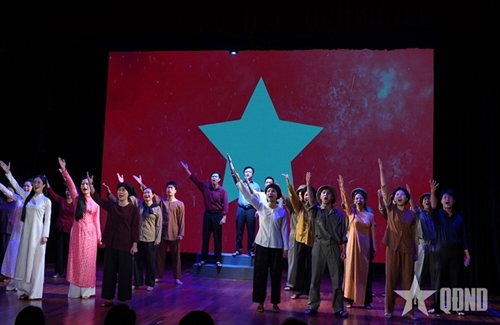Set in the tense days leading up to the August Revolution, the musical highlights the spirit of national unity and honors the image of President Ho Chi Minh. In an interview granted to the People’s Army Newspaper, Korean director Cho Joon Hui expressed his admiration for the Vietnamese people’s deep patriotism and profound respect for their beloved leader.
When asked about the title “Cafe Banh Mi,” Director Cho Joon Hui explained that coffee and banh mi are two of the most iconic staples in Vietnam. “I’ve heard about them often on Korean radio, so I think they symbolize the Vietnamese people,” the Korean director said.
What struck Cho most, however, was how Vietnamese people affectionately call President Ho Chi Minh “Uncle Ho,” a term that is so intimate, simple, and affectionate, like the way one speaks to a beloved family member. “Every time I think about that, I feel deeply moved. That’s why I’m determined to stage this production in Vietnam, in the form of a musical, because music has the power to fully express human thoughts and emotions,” said Director Cho Joon Hui.
The Korean director added that he wants to use the language of art to express gratitude to Uncle Ho and to honor the countless silent heroes who sacrificed their lives for Vietnam’s independence and freedom. In this story, the spirit of President Ho Chi Minh is reflected in ordinary people and unsung warriors. That’s the inspiration behind the title “Cafe Banh Mi.”
Cho’s decision to stage the musical in Vietnam stemmed not only from the admiration but also the similarity of the history of the two countries. “Like Vietnam, our country, was once invaded and ruled by foreign powers. As a citizen, I carry within me the belief that ‘nothing is more precious than independence and freedom,” the director said.
In March 2024, Choi happened to know that Vietnam would soon commemorate the 80th anniversary of its independence. At that time, the director received the script for “Cafe Banh Mi” from writer Seo Sang Wan and artistic director Park Hyun Woo, he immediately accepted their invitation. “I didn’t hesitate for a second. I formed the production team right away,” said Choi.
Though he had long dreamed of creating a musical about revolution, independence, and freedom, Cho acknowledged that such themes no longer resonate strongly with contemporary Korean audiences. The Korean director said, “In contrast, Vietnam feels different. Watching recent events in your country on the media, I admire the pride of the people, especially the youth, and their respect for history. I was genuinely moved by their patriotism.” It was the emotion that brought him to Vietnam. He is determined to stage the musical as a tribute not only to President Ho Chi Minh, but also to the Vietnamese people’s enduring love for their homeland.
    |
 |
|
Artists preparing for the musical |
The spirit guided his collaboration with both his Korean colleagues and the artists of the Vietnam National Drama Theater. Together, they set a goal to premiere the musical on the occasion of the 80th anniversary of Vietnam’s National Day. Looking ahead, they hope to tour the production in France, RoK, and Japan.
To prepare for the project, Cho immersed himself in historical research and received valuable input from writer Seo Sang Wan. He admitted that the giant volume of materials made him overwhelmed. However, he has always received the active support from his Vietnamese partners, such as script adapter Le Trinh, People’s Artist Hoang Lam Tung, artistic director Meritorious Artist Kieu Minh Hieu, and composer Tuan Nghia. After more than a year of discussions, the team decided to focus the musical on real individuals from a pivotal era in Vietnamese history, the days just before the nation’s independence. At the heart of the narrative is the sound leadership of the Communist Party of Vietnam and President Ho Chi Minh.
It also highlights the significant role of the petite bourgeoisie during this time, centering on a female character from this class who makes remarkable contributions to the revolution.
Talking about the potential for developing musicals in Vietnam, Director Cho Joon Hui voiced strong belief in the future of this kind of art. From what he has seen, Vietnam is seriously investing in musical theatre training and performance. He took RoK as a typical example. From an unfamiliar genre, musical theater in RoK has flourished for over three decades, with many homegrown productions touring internationally in the U.S., Europe, and beyond. It has also become one of the genres in the strategy for culture industry development in the country.
Translated by Tran Hoai